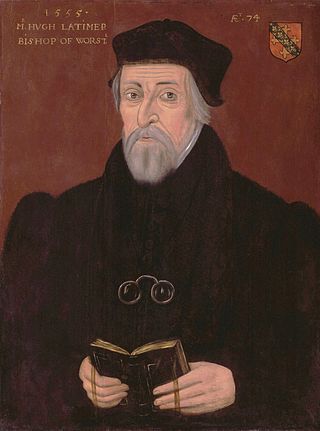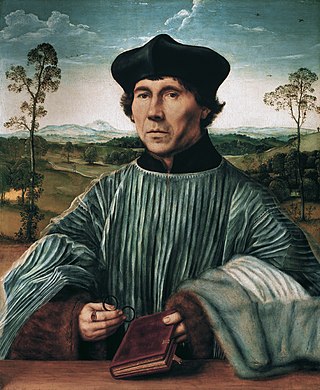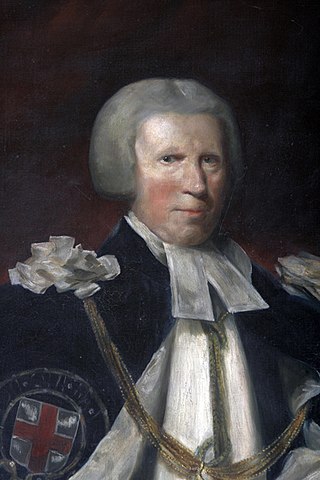Associations
Cheston has tentatively been identified as the godson of Stephen Gardiner, bishop of Winchester, who in his will named a godson "Cheston of Burye". [5] He is listed under "close relatives, household and servants" of Gardiner by Diarmaid MacCulloch, both at Cambridge and at Oxford. [6]
In 1561 Cheston gave a copy of Cicero's works to Bury St Edmunds Grammar School. [3] He would not have been a pupil there: this free grammar school was set up in 1550. It was, however, soon closely associated with Gardiner, and a recognised "conservative force" locally. Henry Harvey gave to the library there in 1560. [7] The first head of the school was John King, who died in 1552. Cheston was a witness to King's will, and (unlike the first witness) was not noted as a priest. [8] [9]
Archdeacon of Winchester
Gardiner, appointed bishop by Mary I of England, made Cheston Archdeacon of Winchester, collated on 12 March 1554. [10] It followed the removal from the post of John Philpot (executed 1555), who by March 1554 had been excommunicated and was in the King's Bench Prison. [11]
Cheston remained archdeacon, until his death on 1 February 1572. [10] In 1564 Robert Horne as bishop of Winchester started proceedings against Cheston as archdeacon, on the grounds that his collation in 1554 was invalid in law. Horne did not have at this the full support of his diocesan staff for his strongly Protestant views, and nothing came of the case. Horne's chancellor George Acworth did limit Cheston's administrative powers to deal with wills of the clergy. [1] [12]

Edmund Bonner was Bishop of London from 1539 to 1549 and again from 1553 to 1559. Initially an instrumental figure in the schism of Henry VIII from Rome, he was antagonised by the Protestant reforms introduced by the Duke of Somerset and reconciled himself to Catholicism. He became notorious as "Bloody Bonner" for his role in the persecution of heretics under the Catholic government of Mary I of England, and ended his life as a prisoner under Queen Elizabeth I.

Hugh Latimer was a Fellow of Clare College, Cambridge, and Bishop of Worcester during the Reformation, and later Church of England chaplain to King Edward VI. In 1555 under the Catholic Queen Mary I he was burned at the stake, becoming one of the three Oxford Martyrs of Anglicanism.

Stephen Gardiner was an English Catholic bishop and politician during the English Reformation period who served as Lord Chancellor during the reign of Queen Mary I and King Philip.
Herfast or Arfast (died 1084) was the first Lord Chancellor of Norman England. He was also Bishop of Elmham and later Bishop of Thetford, after he moved his see there.
Thomas Watson was a Catholic Bishop, notable among Catholics for his descriptions of the Protestant Reformation. Historian Albert Pollard described Watson as "one of the chief Catholic controversialists" of Mary Tudor's reign.

Peter Mews was an English Royalist theologian and bishop. He was a captain captured at Naseby and he later had discussions in Scotland for the Royalist cause. Later made a Bishop he would report on non-conformist families.
John Ponet, sometimes spelled John Poynet, was an English Protestant churchman and controversial writer, the bishop of Winchester and Marian exile. He is now best known as a resistance theorist who made a sustained attack on the divine right of kings.

Sir George Pretyman Tomline, 5th Baronet was an English clergyman, theologian, Bishop of Lincoln and then Bishop of Winchester, and confidant of William Pitt the Younger. He was an opponent of Catholic emancipation.
Henry Cole was an English Roman Catholic churchman and academic.
Richard Nykke became bishop of Norwich under Pope Alexander VI in 1515. Norwich at this time was the second-largest conurbation in England, after London.

James Montague was an English bishop.
John White was a Headmaster and Warden of Winchester College during the English Reformation who, remaining staunchly Roman Catholic in duty to his mentor Stephen Gardiner, became Bishop of Lincoln and finally Bishop of Winchester during the reign of Queen Mary. For several years he led the college successfully through very difficult circumstances. A capable if somewhat scholastic composer of Latin verse, he embraced the rule of Philip and Mary enthusiastically and vigorously opposed the Reformation theology.
John Coldwell (c.1535–1596) was an English physician and bishop.
William Kingsmill alias William Basyng (?–1549) was Prior of St. Swithun's Priory, Winchester until the Dissolution of the Monastery in 1539; it was a Benedictine monastic house and its shrine to the saint popularly associated with determining the entire period of pre-harvest weather was a place of pilgrimage. He was appointed as the first Dean of Winchester Cathedral at the foundation of the new chapter in 1541.
John Bullingham was the Bishop of Gloucester in the Church of England from 1581.
John DakynDCL was an English cleric and historian. He was archdeacon of the East Riding of Yorkshire and a noted chronicler of the Pilgrimage of Grace.
Thomas Martin (1521-1593), of Winterbourne St. Martin, Dorset; Steeple Morden, Cambridgeshire, and London, was an English lawyer, controversialist and politician. He was prominent in the trial of Thomas Cranmer.
John Seton D.D. was an English Roman Catholic priest, known as the author of a standard logic text.
Roger Tonge otherwise Roger Tong or Tongue was an English clergyman who served as a chaplain to Edward VI and was later appointed dean of Winchester Cathedral in 1549.
Edmund Steward otherwise Stewart or Stewarde was an English lawyer and clergyman who served as Chancellor and later Dean of Winchester Cathedral until his removal in 1559.
This page is based on this
Wikipedia article Text is available under the
CC BY-SA 4.0 license; additional terms may apply.
Images, videos and audio are available under their respective licenses.





